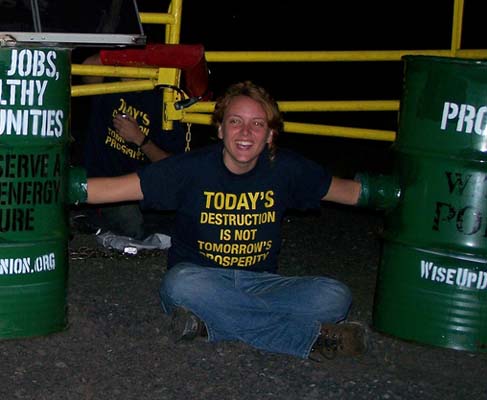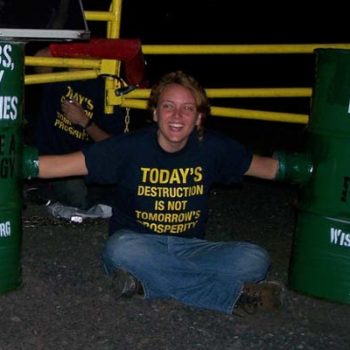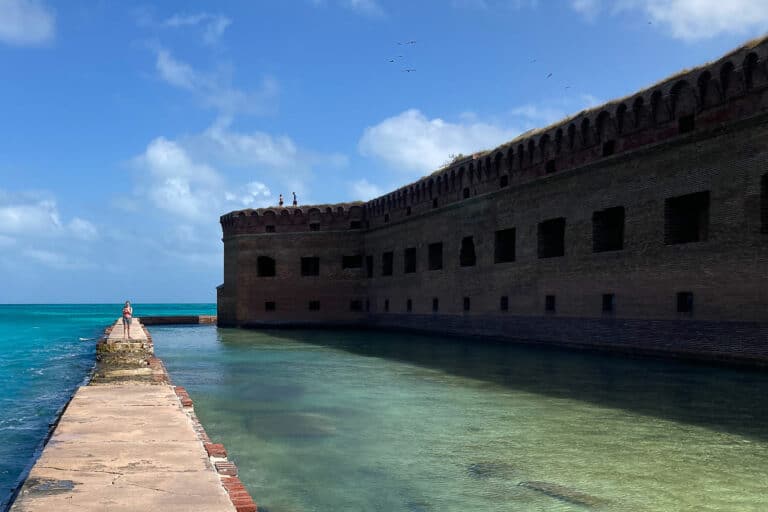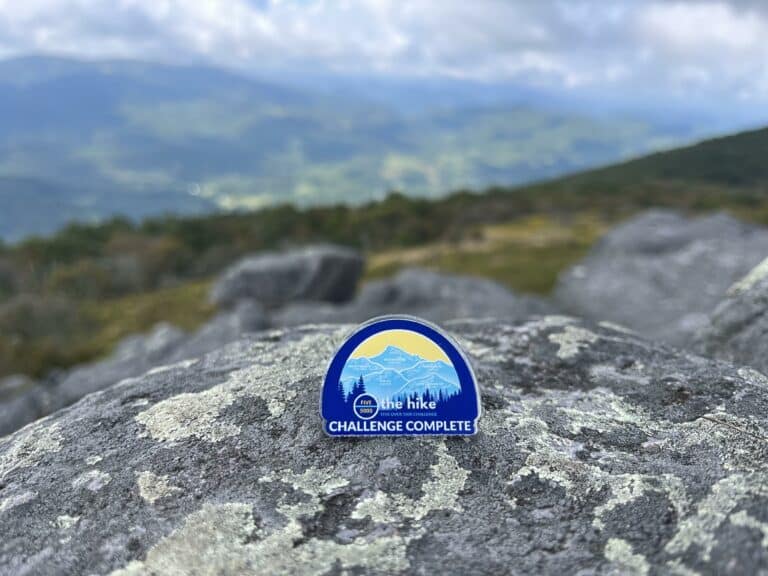Appalachian activists answer Al Gore’s calls for civil disobedience to stop coal. But can direct action do more harm than good?
Before dawn on September 15, thirty protesters entered the construction site for Dominion Energy’s proposed coal-fired power plant in Wise County, Virginia. Nine of them locked themselves to 50-gallon drums, forming a human blockade at the main entrance to the site. Two chained themselves to the main gates. A banner, lit by solar power, stretched across the road saying “Renewable Jobs to Renew Appalachia.” The action halted construction on the site for the better part of the morning, and 11 activists were arrested and charged with trespassing and unlawful assembly.
The Wise County blockade is just one in a series of civil disobedience actions designed to show opposition to coal-fired power plants and mountaintop removal practices. In July, over 100 people marched in front of Zeb Mountain, a mountaintop removal site in Eastern Tennessee. Last June, in Washington D.C., hundreds of students protested in front of the regional headquarters of Citibank, one of the largest financial supporters of the coal industry. In April, eight protesters were arrested for locking themselves to bulldozers to stop the construction of Duke’s Cliffside coal-fired power plant in North Carolina.
Frustrated with the current political and legislative system, some environmental activists are using civil disobedience to turn Appalachia into a public battleground against coal-fired power. The demonstrations have polarized the environmental movement: mainstream nonprofits like the Sierra Club officially repudiate civil disobedience, opting to use political pressure and litigation to effect change. But as mainstream America becomes more informed about the destructive practices of King Coal and outraged by the political system’s inability to deal with the situation, can peaceful civil disobedience be the catalyst for environmental change in the 21st century as it was for social change in the 20th century? Or will these acts only alienate the environmental movement just as it is finally breaking into the mainstream?
* * *
Chris Irwin has been arrested 16 times, all in the name of Mother Earth. As an activist and defense attorney, Irwin has worked on environmental campaigns across the United States, but says he’s never seen a political system so compromised as the one that regulates coal.
“Nothing is working. We’re slowing down coal and mountaintop removal, but we’re not stopping it.”
Irwin works with United Mountain Defense, an Eastern Tennessee based group battling mountaintop removal in the Volunteer State as well as the creation of coal-fired power plants throughout the Southeast. The root of Irwin’s frustration lies in the enormous influence King Coal has over the political process.
Most existing power plants don’t comply with federal clean air standards established by the Clean Air Act. Even worse, companies operating the power plants are given permits to build new plants that also will not comply with the Clean Air Act.
Coalitions of states and environmental organizations have sued the Environmental Protection Agency repeatedly in an attempt to force them to enforce existing laws, but the EPA has continued to drag its feet. In April 2007, the Supreme Court stepped in and directed the EPA to regulate emissions from coal-fired power plants. A year later, 18 states, two cities, and 11 environmental groups were forced to sue the EPA again for failing to follow the court ruling and regulate emissions.
While the lawsuits over existing coal-fired power plants pile up, 28 new coal-fired power plants are currently under construction in the United States and another 20 have permits or are near the start of construction.
And that’s just the production side of the coal issue. The extraction of coal through mountaintop removal mining is even more controversial. Coal companies can legally blow up mountain tops and dump mining waste into streams and valleys, thanks to a Bush Administration’s revision of the Clean Water Act. As a result, 470 mountains have been beheaded and 1,200 miles of Appalachian streams have been buried. Last month, the Bush Administration proposed further weakening of the Clean Water Act, gutting a buffer zone rule that prohibited mining activity within 100 feet of flowing streams. This was one of the last regulatory measures in the Clean Water Act protecting rivers from mountaintop removal.
Appalachian communities can’t even turn to their local elected officials for help. Many politicians from states most affected by the coal industry’s practices are also some of King Coal’s most ardent supporters. In West Virginia, Governor Joe Manchin (D) has proposed building a series of liquid coal plants, while Senator Robert Byrd (D), one of the most powerful politicians in Washington, has stood on the Senate floor adamantly supporting mountaintop removal and fictitious ‘clean coal.’
This impotent political system has led even mainstream politicians and scientists to call for acts of civil disobedience. In September, former vice president Al Gore said, “If you’re a young person looking at the future of this planet and looking at what is being done right now, and not done, I believe we have reached the stage where it is time for civil disobedience to prevent the construction of new coal plants that do not have carbon capture and sequestration.”
It’s not the first time Gore has spoken out in favor of civil disobedience. In an August 16, 2007, New York Times article, Gore said, “I can’t understand why there aren’t rings of young people blocking bulldozers and preventing them from constructing coal-fired power plants.”
Dr. James Hansen, the top climate scientist at NASA and the first scientist to bring global warming to the government’s attention in the ‘80s, has uttered similar sentiments, declaring, “It seems to me that young people, especially, should be doing whatever is necessary to block construction of dirty coal-fired power plants.”
* * *
Gore and Hansen are literally telling a generation of Americans to break the law in defense of a higher moral law. Not surprisingly, these comments have disturbed many in the mainstream environmental movement who have spent decades distancing themselves from illegal acts of civil disobedience.
“That [civil disobedience] is fundamentally the wrong approach,” says Cale Jaffe, a staff attorney with the Southern Environmental Law Center (SELC). “Illegal protests are contrary to our collective mission to use legal pressure to oppose coal-fired power. I don’t think someone can appeal to the power of the law to achieve a just result and ignore the law in the process. You can’t have it both ways.”
Instead of civil disobedience, the Southern Environmental Law Center depends on policy advocacy and legal pressure. These are the same tactics the Sierra Club, the nation’s largest environmental organization, uses to fight environmental battles from coal to deforestation.
By and large, environmental battles in the United States are waged at the negotiation table and in the courtroom, fought by lawyers in suits, not hippies in Birkenstocks. And they’ve achieved some great successes, even in the coal arena. Legal and political pressure led Florida to cancel several plans for new coal plants. Governor Kathleen Sebelius (D) of Kansas vetoed a new coal power plant in her state. And California has not only banned coal plants within the state, but also stopped importing coal power burned in other states. In total, the Sierra Club has helped kill more than 60 proposed coal-fired power plants.
“We’re seeing coast-to-coast victories against coal-fired power plants,” says Bruce Nilles, director of the club’s National Coal Campaign. “We use a mix of litigation and public outreach and education to fight these new plants. The lawsuits give us time to educate the public and look at all the choices. With an informed public, no one says, ‘Let’s burn coal.’”
However, curbing emissions from existing coal-fired power plants has been more challenging. Most of the 600 existing coal plants in the U.S. operate in violation of the Clean Air Act, which the EPA is unwilling to address.
“It’s a long road just to get compliance on existing plants,” says Cale Jaffe, senior attorney with Southern Environmental Law Center (SELC). “We’re suing Duke Energy in North Carolina over their failure to comply with clean air laws on their existing plants. We won unanimously in the Supreme Court, but the case is back in the lower courts, being fought again. There’s still a long way to go.”
SELC is in a similar legal battle over Duke Energy’s new Cliffside power plant, which doesn’t use the best available technology to capture mercury and other emissions and would commit North Carolina to 40 more years of coal-fired energy. Even though the permits for the plants are being legally challenged in court, Duke has already begun construction of the facility.
And in the Mid-Atlantic, the Piedmont Environmental Council is one of several organizations opposing the Department of Energy’s National Interest Electric Transmission Corridors. These corridors give power companies the right to seize public and private lands to build giant transmission lines, which will ensure the nation’s dependence on coal-fired power for decades to come. More legal challenges are expected.
All of these environmental law groups depend on their legal standing and nonprofit funding to continue fighting the coal companies in the courtroom. While mainstream environmental groups often sympathize with activists’ concerns, they cannot officially endorse their actions for a couple of reasons: not only does illegal activity compromise their legal standing before the court, but many nonprofit funding sources want to steer clear of activists participating in civil disobedience.
Jaffe warns that acts of civil disobedience like the one in Wise County, Va., could undermine the anti-coal movement by alienating the general public. “In a relatively conservative state like Virginia, unfortunately, those protests are used as ammunition to create the false stereotype that environmentalists are fringe extremists. I don’t think there’s anything fringe about what these protestors are doing, and I respect their motives, but their actions are often misunderstood.”
* * *
“No social movement in history has succeeded without action,” says Adrienne Brown, the executive director of the Ruckus Society, a national organization that teaches grassroots organizations how to stage effective acts of civil disobedience. “Civil disobedience is the act of getting arrested to challenge an unjust political power. There is a constant need for civil disobedience.”
Mahatma Gandhi often used civil disobedience, especially during his year long “Salt Campaign” where 100,000 Indians were jailed for deliberately violating the Salt Laws. “Non-cooperation with evil is as much a duty as cooperation with good,” he said. Henry David Thoreau refused to pay war taxes in 1849 because “when a person’s conscience and the laws clash, that person must follow his or her conscience.” And Martin Luther King’s civil rights movement—which relied upon civil disobedience—appealed to a higher moral law than the Jim Crow laws on the books.
In the spirit of Gandhi and King, members of the group Rising Tide chained themselves to the bulldozers at the Cliffside construction site earlier this year to protest the illegal permitting of the coal-fired power plant.
“The regulatory processes are intrinsically biased toward the corporations, and they don’t take public opinion into account,” argues Abigail Singer, a member of Rising Tide. “Taking direct action is a way for the powerless to empower themselves.”
Bruce Nilles with the Sierra Club understands Singer’s frustration, even though his organization does not support illegal acts of civil disobedience.
“There is a strong argument that the rule of law is not working,” he says. “People are disillusioned with the political process, and that’s not good for America.”
For proof of King Coal’s undue influence on the political process, activists point to the individuals that the Bush Administration has appointed to key positions overseeing environmental policy: Steven Griles, James Connaughton, and John Pemperton—all former or current lobbyists for the coal industry—have led efforts to dismantle environmental regulations and encourage more coal-fired power plants. King Coal has been entrenched in American politics for decades, but these Bush-appointed coal and energy company advocates have literally been shaping federal policy and environmental regulations to favor the coal industry and mountaintop removal for the last eight years, which has led to massive infringements on human rights for the citizens of Appalachia.
According to the EPA’s own report in 2003, “The impact of mountaintop removal on nearby communities is devastating. Dynamite blasts needed to splinter rock strata are so strong that they crack the foundations and walls of houses. Mining dries up an average of 100 wells a year and contaminates water in others. In many coalfield communities, the purity and availability of drinking water are keen concerns.”
Studies also show that coal-fired power plants have created “hot spots” of lung disease with increased levels of asthma and respiratory-related deaths. The EPA estimates pollution from these power plants cause 24,000 premature deaths a year. Forget the environmental impacts; coal is literally killing American citizens.
“People throughout the coalfields are outraged,” says Chris Irwin with United Mountain Defense. “We’ve been colonized for the last 100 years. The communities that are richest in resources are some of the poorest economically and physically. In Tennessee, we’re having regional drought meetings while corporations are blowing up clean watersheds to mine coal. That’s our drinking water. People from Appalachia are willing to put their bodies on the line to fight this battle, now more than ever.”
While Nilles disagrees with Irwin’s tactics, he wholeheartedly agrees with his sentiments. “The destruction from mountaintop removal is truly a national disgrace. This wouldn’t be happening anywhere else except for Appalachia. At the end of the day, [coal] is a moral issue.”
Using morality as a defense for peaceful civil disobedience is becoming more prevalent in Appalachia and around the world. The 11 protesters who were arrested at the Wise County power plant pled guilty and accepted a $400 fine and 25 hours of community service. But in a statement to the court, protester Robin Markle said, “I went ahead with my actions knowing they were illegal because I am afraid for the future of our world. I feel that I would be acting in a far more morally reprehensible manner were I not to take a stand at this time.”
This past September, six Greenpeace members used a similar defense when they were tried in England for scaling a 630-foot chimney at a coal-fired power plant and spray painting “Gordon,” the name of the British Prime Minister, on the stack. They were protesting the plans to build new coal plants at that site. The Greenpeace members admitted they trespassed and vandalized the plant, causing 35,000 pounds worth of damage, but pleaded not guilty based on “lawful excuse,” a law that gives a person the right to damage property in an attempt to stop further damage (similar to breaking down a door to fight a house fire). The Greenpeace members claimed their trespassing and vandalizing was justified because they were trying to prevent further global warming damage caused by increased emissions from more power plants. The jury agreed with them, acquitting the protestors of all charges.
The Greenpeace verdict in England sent a message to Parliament about what that country’s citizens will no longer tolerate. After the trial, one of the Greenpeace Six said, “This verdict marks a tipping point for the climate change movement. When a jury of normal people say it is legitimate for a direct action group to shut down a coal-fired power station because of the harm it does to our planet, then where does that leave the government on energy policy?”
* * *
Still, acts of civil disobedience run the risk of alienating the general public. Chris Irwin and the United Mountain Defense ran into a reluctant conservative population when they first started protesting the Zeb Mountain mining site in Eastern Tennessee.
“Doors were slammed in our faces, and miners screamed at us,” Irwin says. “We discovered that here in the South, you can’t show up grungy. We needed to shape our image more appropriately.”
Instead of staging controversial actions that could alienate the very community that was being most affected by the mountaintop removal site, Irwin and United Mountain Defense planned an open, respectful demonstration, discussing the march beforehand with church groups, community leaders, and even the police. Perhaps most importantly, they abandoned the hippie garb and donned their Sunday best.
“It’s amazing how differently people react to you when you’re wearing a suit,” Irwin says. “We had more than 100 protesters, church goers, hunters, people who support the Iraq War. We started our march with a prayer—a first for me. The four people who were arrested were wearing suits. The crowd sang ‘Amazing Grace’ as they were handcuffed. It’s not as sexy as a bunch of tree huggers hiding in Redwoods, but we noticed a huge difference in how we were received. The miners who used to scream at us from the sidelines were bowing their heads as we marched by. This may be the rusty buckle of the Bible Belt, but there’s a new movement toward stewardship in Christianity. And we’re reaching out to them.”
Demonstrations like the Zeb Mountain March still may not be the preferred mode of action of environmental powerhouses like the Sierra Club, and there is no doubt that litigation has had success in fighting new coal-fired power plants, particularly outside the Southeast. But civil disobedience can do something that a lawsuit cannot do. Peaceful civil disobedience, when used appropriately, can create a movement. Marching for a cause can engage the public in a way that litigation never will.
“To go at an industry as big as coal, we need a variety of different tactics,” says Scott Parkin of the Rainforest Action Network. “Litigation is important, regulation is important, but so is civil disobedience. These small groups in Appalachia are getting Dominion Energy’s attention—and more importantly, the attention of the general public.”










